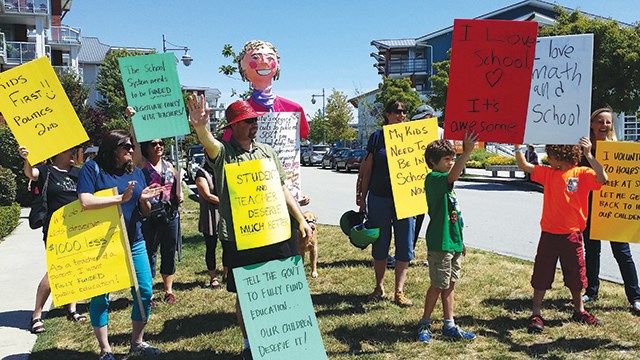There’s no doubt that emotions are running high in the teachers’ contract dispute, so it is perhaps not surprising that all kinds of people are trying to whip up enthusiasm getting recall campaigns organized against B.C. Liberal MLAs.
All I can say is, good luck with that. Since the recall legislation came into effect in the 1990s, there have been 24 applications for a recall campaign filed with Elections B.C.; only a handful got off the ground, and all failed miserably (one was withdrawn after the MLA in question quit).
The bar for recalling an MLA is rightly set very high. For a recall petition to succeed and force a by-election, 40 per cent of the registered voters in the riding in question must sign the petition within 60 days.
In a number of B.C.’s ridings, the number of signatures required actually exceeds the number of people who actually voted, in total, in the last provincial election.
On social media (Twitter and Facebook), many teachers are talking about launching a recall campaign against Education Minister Peter Fassbender in his riding of Surrey-Fleetwood.
For such a campaign to succeed, 14,226 people in his riding must sign a petition within two months. To put that in perspective, slightly less than 18,000 people in total even voted in Surrey-Fleetwood in the last election (including 8,200 for Fassbender).
This means that about 80 per cent of those who voted last time would have to sign the petition, or that thousands of people who didn’t vote before would have to be convinced to participate in an electoral process that they refused to partake in previously.
There is little evidence (yet) that the general public is as up in arms over the dispute as the teachers understandably are. There are no doubt a lot of angry and frustrated parents out there, but only about half of those who live in Fassbender’s riding likely even have children in the school system, so why should they be expected to sign a petition booting him from office en masse?
Others have suggested a recall campaign against Premier Christy Clark herself in her riding of Westside-Kelowna. There, more than 18,000 people would have to sign a recall petition for it to go forward, which means almost every single person who voted in her by-election victory would have to sign it.
And I can’t see many of her near-12,000 supporters (those who voted for her last time) siding with the BC Teachers Federation over having a premier as their MLA.
All this talk of recall campaigns suggests, again, that many BCTF members communicate in an echo chamber, where the only thing they hear is each other. The average person wants schools to be open, but they don’t necessarily support the BCTF on everything.
As I suggested in last week’s column, much of the public is (rightly or wrongly) of the “a pox on both your houses” view when it comes to the teachers dispute, which doesn’t translate into booting MLAs from office because the teachers’ union is furious.
In the end, a recall campaign arising from that dispute has about as much a chance of succeeding as does one of BCTF president Jim Iker’s suggestions: raising taxes to pay for a new teachers contract. In other words, no chance.
Keith Baldrey is chief political reporter for Global BC. [email protected]



